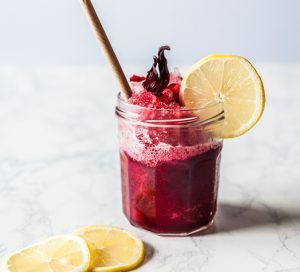 Countless chefs make it their life’s work to source local, seasonal ingredients. It’s what the farm-to-table movement is all about.
Countless chefs make it their life’s work to source local, seasonal ingredients. It’s what the farm-to-table movement is all about.
But what about farm to cocktail glass?
I’m not trying to coin a new phrase (although it does have a ring to it, doesn’t it?). Instead, I’m making a point about how the organic, fresh movement has gone beyond the kitchen and is taking bars, lounges, and cocktails in cool new directions.
When I drum up a drink for Kimpton in my role as Master Mixologist, the current harvest of ingredients – and how I can source it locally – is top of mind. Like chefs, I ferret through farmer’s markets to see how I can weave the flavors into new drinks.
Take bell peppers. The fall treats have a sweet and almost fruity flavor that interacts nicely with raspberries. Taste our version at Square 1682 in Philadelphia. Or stir up your own at home with this recipe.
 x
x
BELL PEPPER SMASH
(for a 5 oz. cocktail glass)
Ingredients:
1 ¾ oz. Plymouth gin
1 oz. Canton Ginger liqueur
½ oz. fresh lime juice
5 raspberries
4 slices of green bell pepper
Directions:
1. In a mixing glass muddle the raspberries, bell pepper, and lime juice.
2. Add the other ingredients and shake with ice. Double-strain into a chilled cocktail glass.
3. Garnish with a lemon twist
Enjoy. And remember, practice makes perfect.
~ Jacques Bezuidenhout, Master Mixologist
For more cocktail talk, follow Jacques on Twitter.






Sounds like an interesting cocktail.
I hope you submit your recipe for our Bartender of the Year Competition. You can submit recipes online at http://www.domainedecanton.com until November 1.
While the bell pepper is a member of the Capsicum genus, it is the only Capsicum that does not produce capsaicin,[2] a lipophilic chemical that can cause a strong burning sensation when it comes in contact with mucous membranes. (An exception to this is the hybrid variety Mexibelle, which does contain a moderate level of capsaicin, and is therefore, somewhat hot). The lack of capsaicin in bell peppers is due to a recessive form of a gene that eliminates capsaicin and, consequently, the “hot” taste usually associated with the rest of the Capsicum genus.-:”,
Please do have a look at our own homepage
<http://www.appendixpain.co